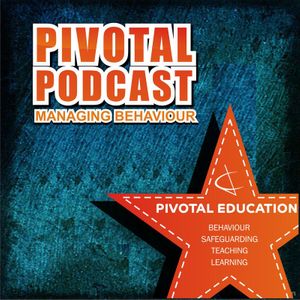Kiran Gill on how to make ‘The Difference’ in behaviour – PP216
Pivotal Podcast - Un pódcast de Pivotal Education

Categorías:
Kiran Gill It was great to welcome Kiran Gill onto the podcast to start our 2019 episodes. Kiran is Founder and CEO of The Difference – an organisation which is creating a new generation of school leaders, specialist in improving outcomes for the most vulnerable children. Kiran began her career in inner-city London, as an English teacher in schools serving the most deprived postcodes in the country. After five years on the frontline, Kiran left to work in education policy, searching for solutions to the rising number of vulnerable children who fall through the gaps. Kiran was working at Social Mobility Commission when she conceived the idea for The Difference. She has led its work full-time since January 2017. Kiran is driven by her own family experiences. Growing up with two adopted sisters, Kiran witnessed the long-term effects of childhood trauma and the lack of support for young people with complex needs. This insight is what keeps Kiran striving for the most vulnerable children to get the education they deserve. The Difference Leaders Programme – applications are now live! Follow the link to find out how you can develop your career, learn from Alternative Provision settings and then reduce exclusions in mainstream schools. At the moment there are 50,000 students in the sector for excluded pupils. There were only 7,000 permanently excluded last year…It’s been estimated that 20,000 pupils disappeared off rolls last year. Kiran believes there isn’t enough understanding about what really works with vulnerable children and we don’t celebrate our inclusive schools enough. High stakes accountability is a problem and it isn’t matched by high support at the moment. Also, Kiran says that the idea of an ‘ideal level’ of exclusions is unrealistic and unhelpful. There are schools who are great at reducing exclusions and these are the schools who are also: * Proactive at supporting children’s wellbeing and safeguarding needs* Good at spotting problems before they escalate Should Alternative Provision be given the best resources or just given what’s left over? Kiran argues strongly that it is nonsensical not to invest in our most vulnerable learners. Her organisation have worked out that nationally less than 2% of excluded children who sit GCSEs in a Pupil Referral Unit, achieve passes in English and Maths. At age 20, almost three quarters still won’t have passes in these subjects and are therefore much less likely to access employment, be prone to mental ill health and, in perhaps the most shocking statistic of all, one in two of the prison population were excluded from school. The lifetime cost of provision for just the pupils excluded last year is £2.9 billion